Colorectal Cancer Strikes Younger Than Ever | BGI Insight
2024-04-18

Over recent decades, the incidence of colorectal cancer (CRC) in individuals under 50 years old, known as early-onset or young-onset CRC (YO-CRC), has been rising according to the American Cancer Society. Projections published on Nature suggest that by 2030, YO-CRC will constitute 11% of colon cancers and 23% of rectal cancers, with notable increases in the United States, Canada, and Australia.
The diagnosis of colorectal cancer (CRC) among young adults aged between 19-39 was more likely to be dismissed or misdiagnosed with other diseases, such as inflammatory bowel disease. When a young patient is diagnosed with CRC, it is often at stage III or IV, which dramatically increases the cost and difficulties of treatment and potentially raises the risk of mortality.
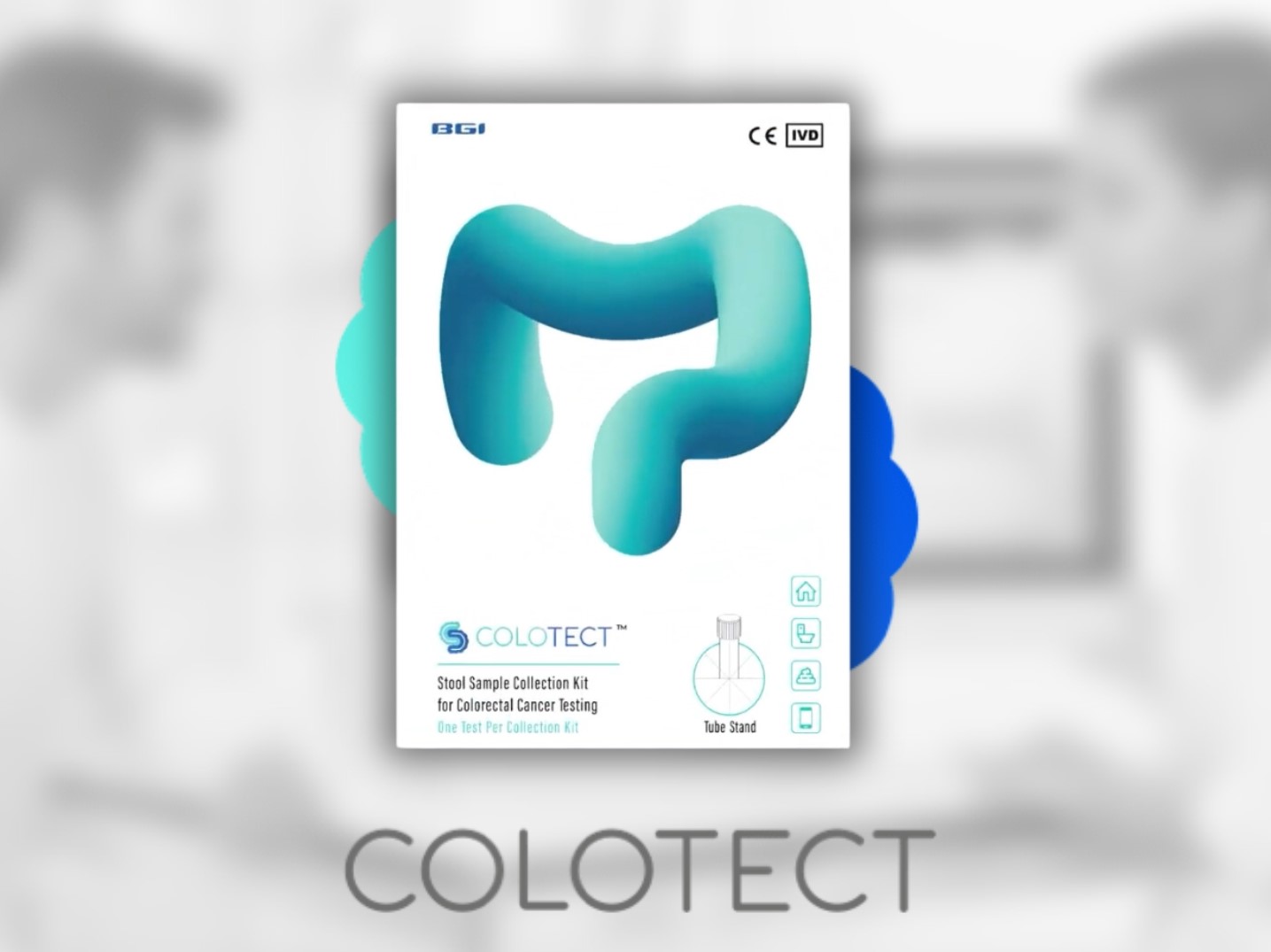
Early screening and regular testing can be an effective way to prevent and treat CRC at an early stage. COLOTECT™, a non-invasive test that requires only a stool sample, is available for colorectal cancer screening and can provide medical professionals with evidence to support their diagnosis. Due to the increase in cases and misdiagnosis of CRC, raising awareness of colorectal cancer among young people and in society is urgently needed.
Dramatically Increase Among Young while Decline for the Elderly
Colorectal cancer should be tested at an earlier age, even though the official guideline is 45, according to the United States Preventive Services Task Force (USPSTF) and the American Cancer Society (ACS). While CRC incidence remains stable in people over 50 years of age in high-income countries, it is rising rapidly in those under 50 years of age.

The graph shows a sharp rise in colorectal cancer incidence among 20-39 year-olds and a relatively stable incidence rate among 40-49 year-olds.
Source: National Institutes of Health: Young-onset colorectal cancer.
Recent National Institutes of Health (NIH) studies show a sharp rise in colorectal cancer (CRC) among 20–39-year-olds. This group has unique clinical and pathological traits. They differ from those seen in people aged 40-49. These findings suggest that the age threshold for colorectal cancer screening may change over time. In the United States, routine CRC screening currently begins at age 45, but as trends evolve, especially in the 45–50 age group, this starting age may be reconsidered to better address youth-onset CRC (YO-CRC). The increase in the incidence of colorectal cancer among young people raises the alarm for regular screening for colorectal health, even at younger ages. Some cases are asymptomatic, and often, symptoms are ignored for various reasons.
Often Misdiagnosed and Symptoms Occur at Advanced
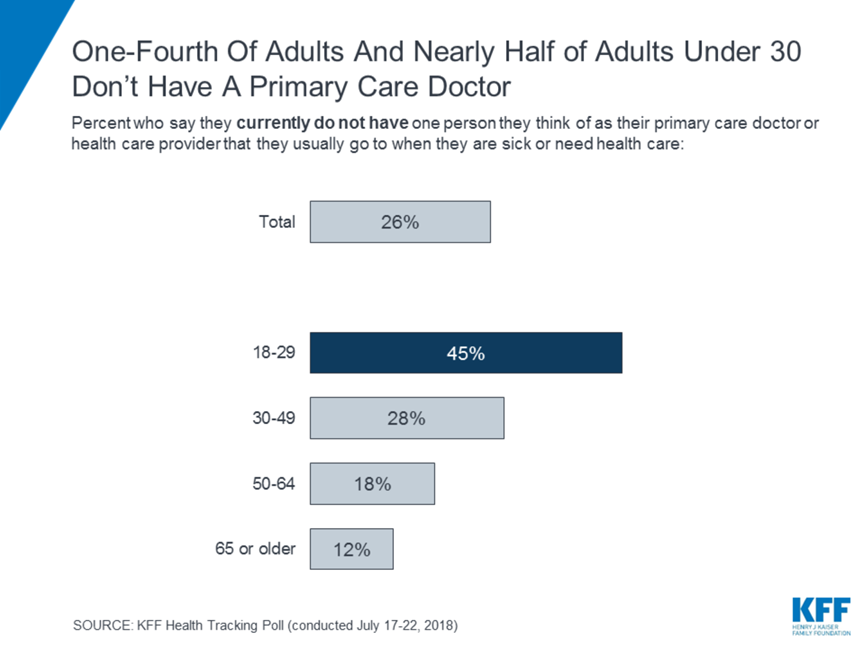
Nearly half of respondents aged under 30 do not have a primary care doctor.
Source: KFF Health Tracking Poll
According to a 2018 KFF Health Tracking Poll, one-fourth of adults and nearly half of those under the age of 30 do not have a primary care doctor. This lack of consistent healthcare means that when it comes to symptoms and cancer diagnosis, medical professionals might not be familiar with the patient’s past medical history, making it harder to provide an accurate diagnosis without additional screening support or access to the patient's previous medical records.
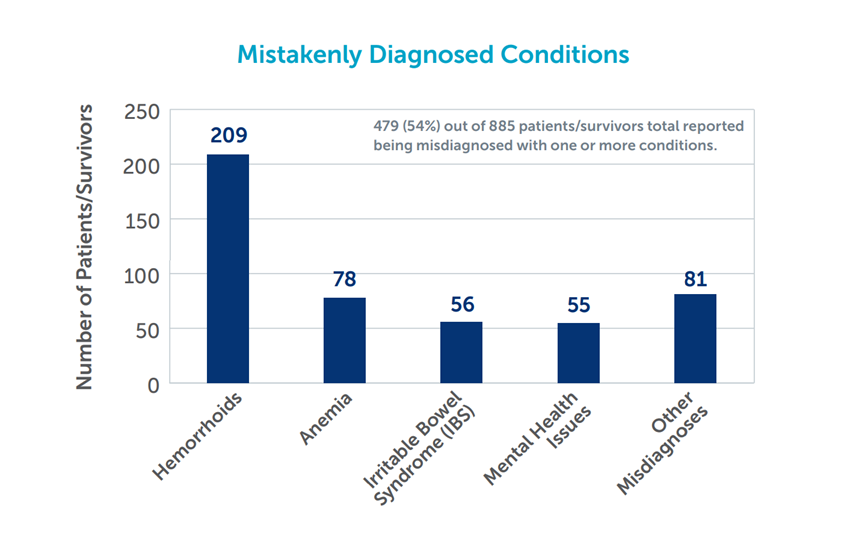
The Colorectal Cancer Alliance survey indicated that 54% of respondents, or 479 individuals, were misdiagnosed with different conditions.
Source: Colorectal Cancer Alliance: Never Too Young Survey and Report.
A survey by the Colorectal Cancer Alliance (CCA, 2020) reveals that young patients aged between 19-39 were more likely to have their concerns dismissed by doctors. The 54% of survey respondents were initially misdiagnosed. Around 75% of young colorectal cancer patients and survivors consulted at least two doctors before receiving a diagnosis, and 40% reported that their doctors ignored their symptoms and concerns.
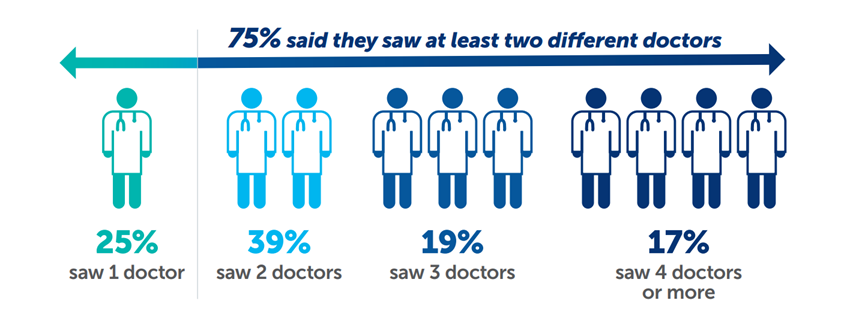
Around 75% of respondents said they saw at least two different doctors before getting diagnosed with colorectal cancer.
Source: Colorectal Cancer Alliance: Never Too Young Survey and Report.
“The provider actually told me, ‘That’s the thing about you students — you have so much knowledge, but you know nothing about medicine,’” Shauna Nguyen told NBC News. In 2016, then-28-year-old Nguyen, who was studying to become a physician assistant, suggested that her symptoms might indicate cancer. She added, “A little bit inside of me also just said, ‘Oh, your symptoms are nothing, Shauna.’” Often, patients are led to believe that a doctor's medical diagnosis is indisputable and should not be questioned, which can lead to the dismissal of early symptoms of CRC as overreactions.
Symptomatic or Not
Many believe that tumors or cancers only develop with symptoms, leading many patients to visit doctors only when feeling unwell. However, according to the latest report from the Colorectal Cancer Alliance (CCA, 2020), the majority (77%) of patients reported being in good or very good health before their diagnosis, with 21% affirming they were in good health. Kathryn Sisler shared her story with NBC News, indicating that not all cases are symptomatic.
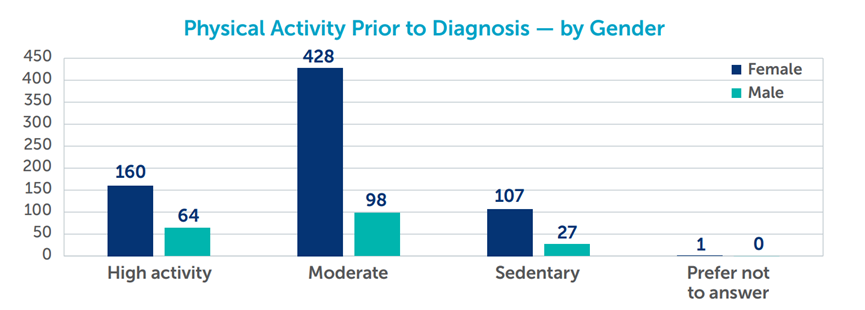
Of survey participants, 85% believed they led an active or very active lifestyle, while 15% replied that they were sedentary.
Source: Colorectal Cancer Alliance: Never Too Young Survey and Report.
At just 30 years old and aware of her family history, Kathryn was advised by her doctor to undergo a colonoscopy. Having lost her father to colorectal cancer, she was committed to maintaining her health. Adhering strictly to a plant-based diet, exercising five or six times a week, training for a half marathon, and teaching yoga in her community, she did everything by the book. Despite her efforts, she faced a dire diagnosis.
The colonoscopy revealed she was at stage III of cancer, with her colon nearly obstructed by a tumor. Kathryn underwent surgery to remove the tumor and had a temporary ostomy—a surgical opening in the abdomen to allow waste to exit into an external bag. Fortunately, by the end of 2023, Kathryn had recovered well enough to resume her passion for yoga and running.
From Awareness to Prevention
The increasing incidence rate of CRC and the difficulties in diagnosing it among young people are raising the alarm for early and regular screenings for colorectal health. Although it's not yet clear why colorectal cancer is on the rise among younger individuals, experts are actively investigating potential factors, including diet, obesity, physical inactivity, smoking, alcohol consumption, and family history. Importantly, raising awareness of CRC in society and consulting a primary care doctor for regular screening tests can help protect you and your family from the risk of cancer.

Photo of Ingrid Hricová, a 54-year-old special education professional from Košice, Slovakia, who is a patient of COLOTECT™ and a fighter against colorectal cancer.
Source: Story of Ingrid Hricová.
“My desire is that it [COLOTECT™] will encourage people to get tested, to take preventive measures, and to take advantage of all the opportunities that modern medicine offers us,” says Ingrid Hricová, another CRC patient, in an interview, highlighting the need for preventive CRC screening.
COLOTECT™ a non-invasive home testing kit and a multi-target fecal DNA test, used alongside the Fecal Immunochemical Test (FIT), can be administered every 3 years for regular colorectal cancer screening. This approach helps in detecting gene mutations and potential risks of CRC at an early stage, even when symptoms are not present.

The recent findings highlight a worrying increase in yearly colorectal cancer rates among young adults, revealing a crucial need for improved awareness and proactive healthcare. Many patients struggle to receive accurate diagnoses, often facing initial misdiagnosis by healthcare providers. Regular screenings help prevent colorectal and other cancers. People of all ages should stay proactive about health, seek multiple doctor opinions if needed, and remind families to get annual check-ups for better health.
When it comes to health, the sooner, the better.
About BGI Genomics
BGI Genomics, headquartered in Shenzhen, China, is the world's leading integrated solutions provider of precision medicine. Our services cover more than 100 countries and regions, involving more than 2,300 medical institutions. In July 2017, as a subsidiary of BGI Group, BGI Genomics (300676.SZ) was officially listed on the Shenzhen Stock Exchange.
Read more:
BGI Genomics 2023 Global State of Colorectal Cancer Awareness Report
Beating Colorectal Cancer with Early Screening and Detection: Patient's Voice